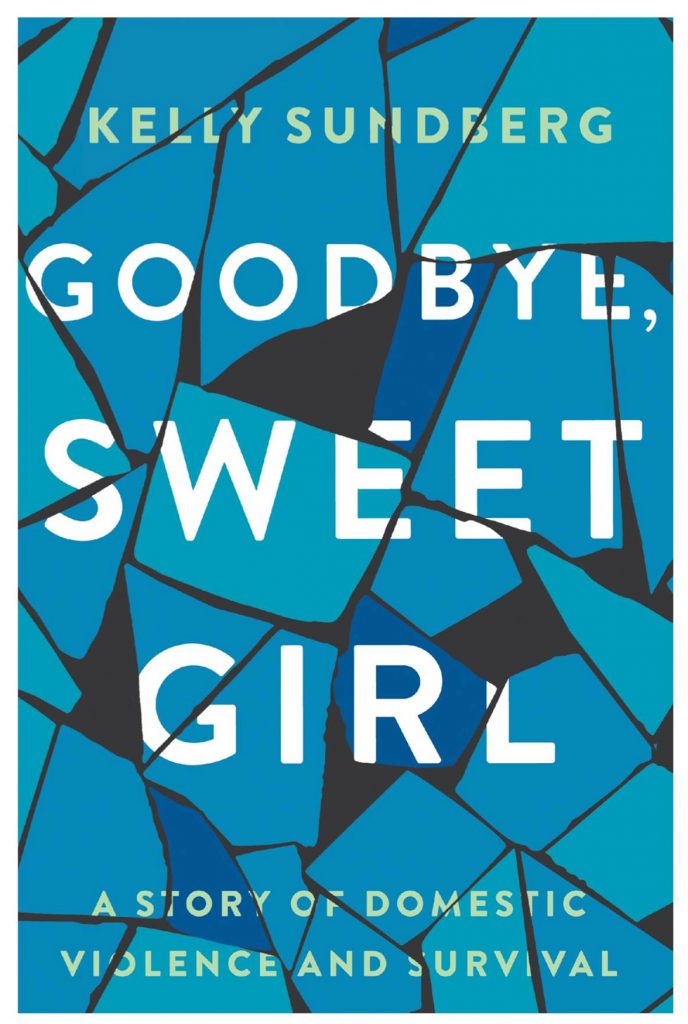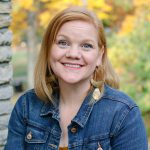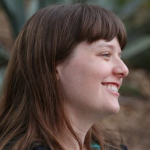Kelly Sundberg’s essays have appeared in Guernica, PANK, Quarterly West, The Rumpus, and here at Proximity. She was published in Best American Essays and awarded a fellowship from A Room of Her Own Foundation. She earned her MFA at West Virginia University and a PhD in creative nonfiction at Ohio University. Just last week, HarperCollins released her debut memoir, Goodbye, Sweet Girl: A Story of Domestic Violence and Survival.
I was captivated by Goodbye, Sweet Girl, and realized only in reading it—-not in hearing her name-—that I’d encountered Kelly’s work on Guernica in 2014. I remembered her skillful use of repetition; I remembered her ability to examine something horrible from so many sides that I, the reader, felt as if I could be living in it. I remembered her ability to elicit sorrow without pity.
Leading up to the launch of her memoir, I had the opportunity to interview Sundberg for Proximity‘s TRUE readers.

Katharine Coldiron: Can you talk about the original composition of thisbook? How did you approach your initial draft? Did you write straight from page one to page 254, or was it more fragmentary?
Kelly Sundberg: I had always been an essayist before starting this memoir, so, at first, I found it difficult to think in the big-picture ways that memoir requires. As a result, I started out approaching the initial chapters like essays that had some kind of transition to the previous chapter at the beginning and a cliff-hanger at the end. That sounds simplistic because it was!
About halfway through the memoir, I stalled because I wasn’t sure how to get it to where I wanted it to go. So I took a few weeks off from writing. One day, while walking, I suddenly realized how I wanted the story to unfold, and from there, I sat down and finished the second half of the book in a somewhat manic burst. I think that the book reads that way—the end moves quicker than the beginning—but that’s accurate to my story, so I’m not sure there was a way around that. By the time that I finished the book, I definitely felt that it read as a memoir rather than a collection of essays, so my initial drafting strategy had really just been a bridge between the two different genres.
KC: In what way do you see your memoir as speaking beyond the personal into the political? Did you have particular influences for this kind of work?
KS: I think that the personal is political, and storytelling can be the ultimate act of subversion, as we’ve seen during the #MeToo movement. I was very influenced by Rebecca Solnit and Roxane Gay. I think that they both do a great job of balancing the personal with the political.
KC: For whatever reason, I keep reading about women not wanting to give the proper name to something that’s happened because the category bears scary implications. If I didn’t consent, then he raped me, and I’m a rape victim. If I admit that he beats me, I’m an abused wife. Do you think this reluctance is about storytelling (we are the stories we tell about ourselves), categorizing, feeling compelled to a frightening course of action, victimization? All of the above?
KS: I think that more likely, not wanting to name something stems from an inability to articulate what happened. When I wasn’t married, I wasn’t able to name the abuse because I simply couldn’t recognize it for what it was. I stayed in the marriage for a long time, but once I named the abuse, I left fairly quickly, and it wasn’t the naming that propelled me to action, but rather the realization that I needed to act that compelled me to name the abuse. I’m also someone who has embraced the word “victim” as a way of describing my role within the marriage. I don’t think that label means that I wasn’t strong during the marriage (I had to be as strong as hell to endure what I did), but I use that label as a way of asserting that he victimized me. Like most abusers, he has tried to re-write the narrative as though he was somehow passive within the abuse, or that it was something outside of his control, but abusers are always in control. Now that I’m out of the marriage, I call myself a survivor rather than a victim, but I’ll own that I was his victim during the marriage.
KC: Such a small rhetorical issue, such important resonance. Very early on in your relationship with Caleb, you spin a bad story about him drinking way too much into something humorous. Was this a one-time thing, or do you think this ability to make light of something troubling became a tendency of yours as things got worse? Did the worldview underlying it help or harm you/your marriage?
KS: My ability to spin situations into humor has both predated and outlasted the marriage, and I think the quality is one of great complexity. On one hand, being able to turn almost anything into a joke has become a form of resilience for me, but it also allowed me to tolerate what should have been intolerable. I’m happiest when I’m laughing, and nothing seems to hurt too much when I can laugh at it. My ex-husband was very funny, and I made a lot of concessions for his bad behavior because he was funny. We had very dark, twin senses of humor, and towards the end our humor became even darker, which I think was a result of our isolation. If only we could joke about this terrible environment that we were enduring, then didn’t that mean that we were really alone in this life? But his abuse never would have worked if he hadn’t been able to convince me that I was a participant in it, and humor was one way that he manipulated me. I can still laugh at terrible things, but I don’t think I’ll ever again laugh away something like abuse.
KC: Obviously there’s nothing funny about the topic of your book, but I feel badly that your sense of humor isn’t showing here. Got a favorite joke you want to share?
KS: I can’t think of a joke offhand, but one of my hobbies is trolling my Facebook friends by posting pictures of rotten food that I’ve found in my fridge with the question, “Can I eat this?” Most people have figured it out by now, but I always have one or two folks who are super concerned about my well-being. I’ve been thinking about turning the posts into a chapbook that would be funny, but also a meditation on single parenting and the difficulty of cooking for oneself (which is why I have so much food waste).
KC: You say about your mother, “I was beginning to realize that no one is ever fully bound by their history.” I wonder how you interpret this statement with regard to Caleb, and with regard to yourself.
KS: I think that I’m a really good example of someone who hasn’t been bound by my history. I left an abusive marriage, I got a PhD, I became a self-sufficient single mother, and in the five years since my divorce, I haven’t been in another abusive relationship. In a lot of ways, I’ve recreated myself into someone better. In other ways, I’ve returned to the person I was before I met Caleb, and in some ways, I’m still that woman being abused and maybe always will be, but I’m not bound by my history.
I can’t speak to whether Caleb is bound by his history or not. He’s remarried, and I will probably never know what that relationship looks like, but my understanding from my son is that Caleb and his new wife get along better than Caleb and I got along. Does that mean that I’m willing to believe that Caleb is unbound from the abuse that he perpetrated on me? No. But if Caleb ever takes responsibility, accepts accountability, and works to make amends, then I’ll happily forgive him. My love for him was real, and feeling resentment towards Caleb and the folks who enabled him is painful for me. I’d much rather be able to set that pain free through forgiveness, but, for me, forgiveness is something that has to be earned.
KC: Before you married Caleb, your mom offered you a way out. But during your marriage, she kept pressuring you to work things out with him. Why do you think she was supportive of you not marrying Caleb, then unsupportive of you leaving the marriage?
KS: My mother always wanted what was best for me, but I think that she had bought into a cultural narrative about marriage and family that was misguided. I also think that, because of my misspent youth, my parents didn’t believe that I could support or take care of myself outside of the marriage, so they were very anxious about my future. I had matured while I was married, but they hadn’t really seen that growth. Now that I’m out of the marriage and raising my child on my own, I think they can see the ways in which I’ve grown, and I also think that they’ve grown. We’re no longer bound in the same ways by our history as a family, and I tried to show that in the final chapters of the book.
KC: Just before you moved to West Virginia, you got a windfall and were making decisions to move you in the right direction, “and suddenly Caleb and I were getting along.” Do you think money stress contributed to your marriage’s dysfunctional patterns?
KS: I think that money stress contributed to stress in the marriage, but I’m hesitant to say that money stress contributed to Caleb’s abuse because a lot of people have stress with money and don’t become abusive, and conversely, domestic violence extends across all socioeconomic classes. I can say that money stress probably kept me from leaving sooner than I did. If I’d had more money, I think that I would have left much earlier.
KC: I was wondering about that. You wrote the book such that I could understand perfectly why you didn’t leave; the social pressure was unreal. Do you think that was stronger than the money motivation?
KS: In my situation, I think it’s impossible to separate the societal pressure from the money pressure. For example, if I’d been more financially independent, I’m not sure that my parents would have pressured me as much to stay in the marriage, or if I’d had stable employment, then maybe I wouldn’t have worried about the stigma of being a single mother. Ultimately I stayed in the marriage because I loved my husband, but looking back now, I realize that money stress was always in the back of my mind.
KC: By all appearances, Caleb was proud of your accomplishments as a writer, but in private, he had to physically tear you down because of them. Can you talk about that a little more? Did writing this book feel particularly good or important in light of this suppression?
KS: It took me a while to realize that Caleb was physically abusing me after each publishing success, and even when I realized that, I still felt more empathy for him than I did for myself. Writing the book did feel particularly important in light of that suppression—not because I felt competitive with Caleb, but because the book gave me the opportunity to tell my story on my own terms. So many survivors never have that opportunity, and I’m incredibly grateful that I’ve been given the chance.
KC: On that topic, what’s going on between you and him regarding this book coming out?
KS: Honestly, we have never talked about the book, though he obviously knows it exists.
KC: It struck me deeply when you wrote that the first time he hit you, you felt relieved because you thought he would stop. It seems like that pattern repeated itself multiple times: you thought he would comprehend the awfulness of what he was doing when he was in the middle of doing it, but no; he only felt guilty later, and still did it again.
KS: At that time, I was just giving him too much credit. I still thought that he had a normal capacity for empathy, which would mean that he would realize how much he had hurt me and stop. Later in the book, I wrote that “I couldn’t have been human to him in those moments,” and that’s representative of the evolution that happened which led to me leaving—I was beginning to see myself as he saw me, which was as a possession or an object rather than a human being. Ultimately I knew that I couldn’t survive that way, so I fled.
KC: One of the usual patterns of abusive relationships is isolating the victim—drawing a wife away from her friends and family. I didn’t see that happening with you as obviously as in other abusive situations I’ve read about. You do write about your marriage in a way that makes it seem you two were emotionally isolated from others—as if he was the only person who could assuage your loneliness.
KS: During our marriage, I was convinced that Caleb and I could only ever fully understand each other because, emotionally, I felt Caleb and I were kindred spirits. In many ways, I could share parts of myself with Caleb that I hadn’t ever been able to share with anyone, which created a kind of false intimacy because he then used those things against me. I also think that being raised in the religious culture of my hometown had created in me an imperative to forgive or make excuse for the bad behavior of men. Too often, women are taught that empathy and forgiveness are attributes we should possess to the expense of all else. I know that I really self-sacrificed in ways I wasn’t even aware of.
KC: Is there anything about the book you want to tell me, TRUE readers, anyone?
KS: I wrote this book as an attempt to try and answer the question of “Why did she stay?” but I do think that’s always going to be the wrong question to ask when it comes to domestic violence. The question we should be asking is, “Why did he abuse her?” But I can’t answer that question. I can only answer the first one.
KC: For my part, I think you successfully answered the first one. Are there other books you want to recommend about this topic? Or any other?
KS: It’s not a literary memoir, but I think that everyone—of all genders—should read Lundy Bancroft’s book, Why Does He Do That: Inside the Minds of Angry and Controlling Men. That book is the closest thing that I’ve found to offering an answer to the question of why men abuse.
KC: Goodbye, Sweet Girl provides us with an important voice on domestic violence—yours. How do you see this influencing your writing choices ahead? How do you balance your literary life and the position of advocacy in which you’ve found yourself?
KS: I’m currently working on a novel that also has a domestic violence component. While I don’t see my story as being limited by my experience, I’m ready to hear a narrative voice in my head that isn’t my own. In terms of balancing my literary life from the position of advocacy in which I’ve found myself, I’ve really just had to adopt a kind of “fuck it” mentality. I worry that folks see me as someone who has received recognition because of my story rather than my writing, but when that worry creeps into my mind, the only thing I can do is say “fuck it.” I believe in my advocacy, but I also believe in my literary talent, my work ethic, and my work as a scholar, and I think that the whole of who I am is made better because of these different aspects of my work.
 KELLY SUNDBERG‘s essays have appeared in Guernica, Gulf Coast, The Rumpus, Denver Quarterly, Slice, and others. Her essay “It Will Look Like a Sunset” was selected for inclusion in The Best American Essays 2015, and other essays have been listed as notables in the same series. She has a PhD in creative nonfiction from Ohio University, and has been the recipient of fellowships or grants from Vermont Studio Center, A Room of Her Own Foundation, Dickinson House, and the National Endowment for the Arts. In 2018-2019, she will be a Postdoctoral Research Fellow at Ohio University.
KELLY SUNDBERG‘s essays have appeared in Guernica, Gulf Coast, The Rumpus, Denver Quarterly, Slice, and others. Her essay “It Will Look Like a Sunset” was selected for inclusion in The Best American Essays 2015, and other essays have been listed as notables in the same series. She has a PhD in creative nonfiction from Ohio University, and has been the recipient of fellowships or grants from Vermont Studio Center, A Room of Her Own Foundation, Dickinson House, and the National Endowment for the Arts. In 2018-2019, she will be a Postdoctoral Research Fellow at Ohio University.
 KATHARINE COLDIRON‘s work has appeared in Ms., the Rumpus, Anomaly, the Offing, and elsewhere. She lives in California and blogs at the Fictator.
KATHARINE COLDIRON‘s work has appeared in Ms., the Rumpus, Anomaly, the Offing, and elsewhere. She lives in California and blogs at the Fictator.


